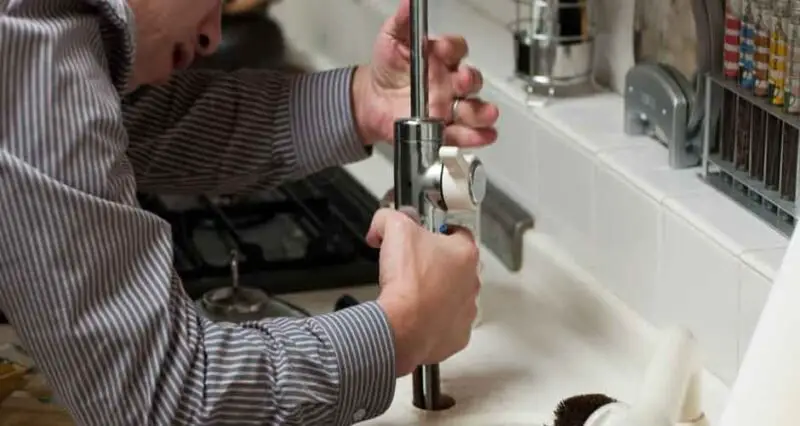
Most common plumbing issues
1. Leaking Faucets
A dripping faucet may seem minor, but it can waste significant water and increase your water bill. A worn-out or damaged washer or O-ring is the most common cause of a leaking faucet. To discuss this issue, turn off the water supply to the faucet and disassemble it carefully. Substitute the faulty washer or O-ring and reassemble the faucet. If the problem persists, conferring with a professional plumber may be paramount to pinpoint and resolve the underlying issue.
2. Clogged Drains
Clogged drains are a frequent plumbing issue in kitchens and bathrooms. They can result from accumulated hair, soap scum, food particles, or grease in the drainpipes. To address a clogged drain, you can use a plunger to create suction and dislodge the blockage. If that doesn’t work, you can use a drain snake or auger to break up the clog. Chemical drain cleaners should be used sparingly, as they can damage pipes over time. For persistent or severe clogs, it’s advisable to call a professional plumber who can use specialized equipment to clear the drain.
3. Running Toilets
A running toilet is not only wasteful but can also be a sign of a more significant problem. The issue is often caused by a malfunctioning flapper valve or fill valve. To address a running toilet, open the tank and inspect these components. If the flapper valve is deteriorated or the fill valve is faulty, replace them. If you’re uncomfortable with this DIY repair, consider hiring a plumber to diagnose and fix the problem. Ignoring a running toilet can result in higher water bills and potential damage to the toilet.
4. Low Water Pressure
Low water pressure can be frustrating, as it affects the efficiency of faucets and showerheads. Several factors can contribute to low water pressure, including mineral buildup in pipes, a partially closed shutoff valve, or a faulty pressure regulator. To address this issue, start by checking all the faucets in your home to determine if the low pressure is localized or widespread. If it’s localized, the problem may be specific to that fixture, such as a clogged aerator. If it’s overall, confer a plumber to diagnose and fix the underlying cause, which may involve cleaning or replacing pipes or adjusting the pressure regulator.
5. Leaking Pipes:
Leaking pipes are a serious plumbing issue that can lead to water damage and mold growth if not addressed promptly. Leaks can occur at joints, fittings, or along the pipe itself. The first step in addressing a leaking pipe is to turn off the water supply to the affected region. If the leak is small and accessible, use a pipe clamp or plumber’s tape as a temporary fix until a professional plumber can assess and repair the pipe. For larger or hidden leaks, it’s best to call a plumber immediately to prevent further damage and ensure a proper, long-lasting repair.
6. Water Heater Problems
Water heaters are essential for providing hot water for showers, washing dishes, and laundry. Common water heater issues include inadequate hot water, unusual noises, and leaks. If you experience inadequate hot water, check the thermostat settings and the size of your water heater. Adjust the thermostat if necessary, and consider upgrading to a larger unit if your household’s hot water demand has increased. Unusual noises, such as rumbling or popping, may be caused by sediment buildup in the tank. Flushing the tank periodically can help alleviate this issue. A professional plumber should address Leaking water heaters immediately to prevent water damage and ensure the unit’s safety.
7. Sewer Line Blockages
A sewer line blockage can lead to unpleasant odors, slow drains, and even sewage backups in your home. Common causes of sewer line blockages include tree root intrusion, pipe corrosion, and the accumulation of debris. If you suspect a sewer line blockage, it’s paramount to consult a professional plumber. They can use specialized equipment, such as a sewer camera, to pinpoint the location and cause of the blockage. Depending on the severity of the issue, they may recommend solutions ranging from hydro-jetting to sewer line replacement.
8. Frozen Pipes
In regions with cold winters, frozen pipes are a common plumbing concern. When water in pipes freezes, it expands, potentially causing the pipes to burst. To prevent frozen pipes, insulate exposed pipes and allow faucets to drip during freezing temperatures. If you suspect frozen pipes, turn off the water supply to the affected area and use gentle heat sources like a hairdryer or heating tape to thaw the pipes. Avoid using open flames or high-temperature heating devices, as they can damage the pipes. If you cannot thaw the pipes or if they have burst, contact a professional plumber immediately.
Understanding common plumbing issues and how to address them is crucial for homeowners. While some problems can be resolved with basic DIY skills and tools, others require the expertise of a professional plumber. Promptly addressing plumbing issues can save you money, prevent water damage, and ensure the efficient operation of your plumbing system. Remember that regular maintenance, such as periodic pipe inspections and drain cleaning, can help prevent many plumbing problems and extend the lifespan of your plumbing system. Suppose you ever encounter a plumbing issue you need help with. In that case, it’s wise to seek the best plumbing services in Portland to prevent further damage and ensure a reliable and safe plumbing system in your home.


